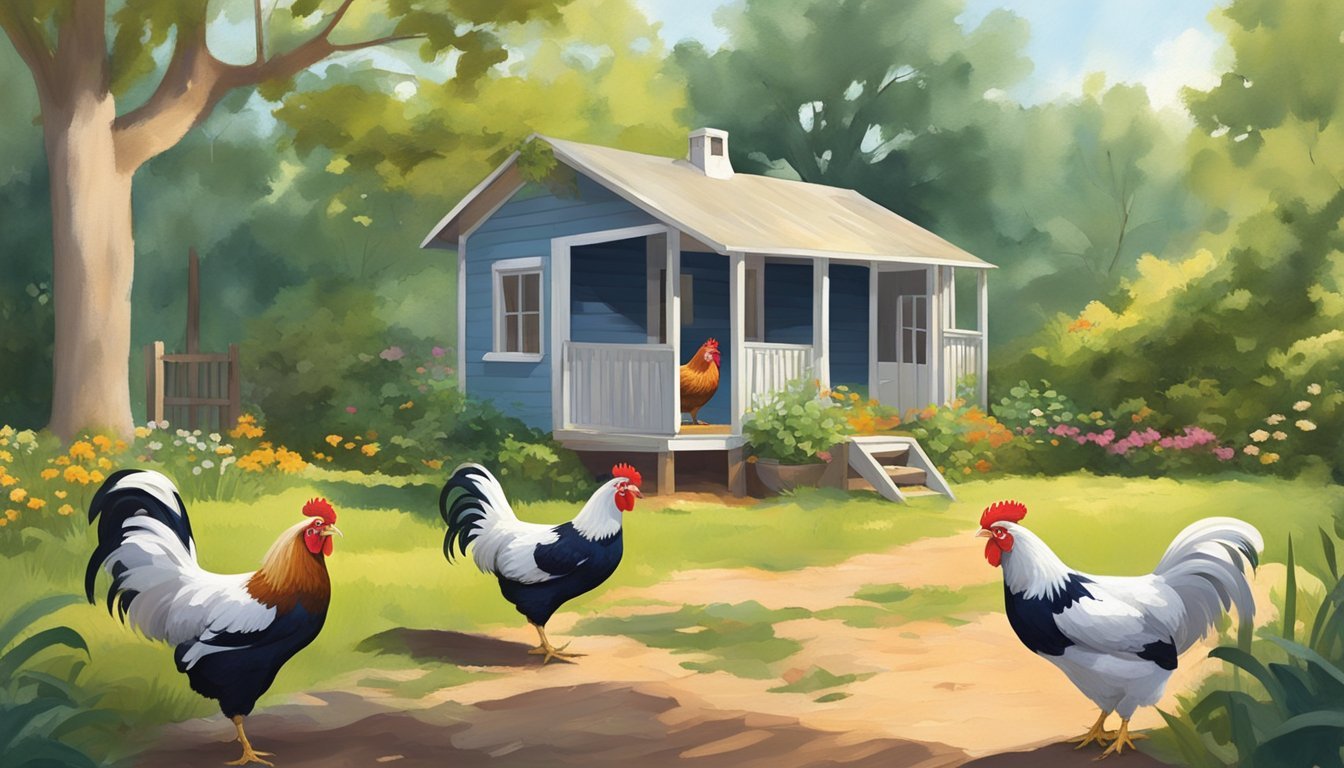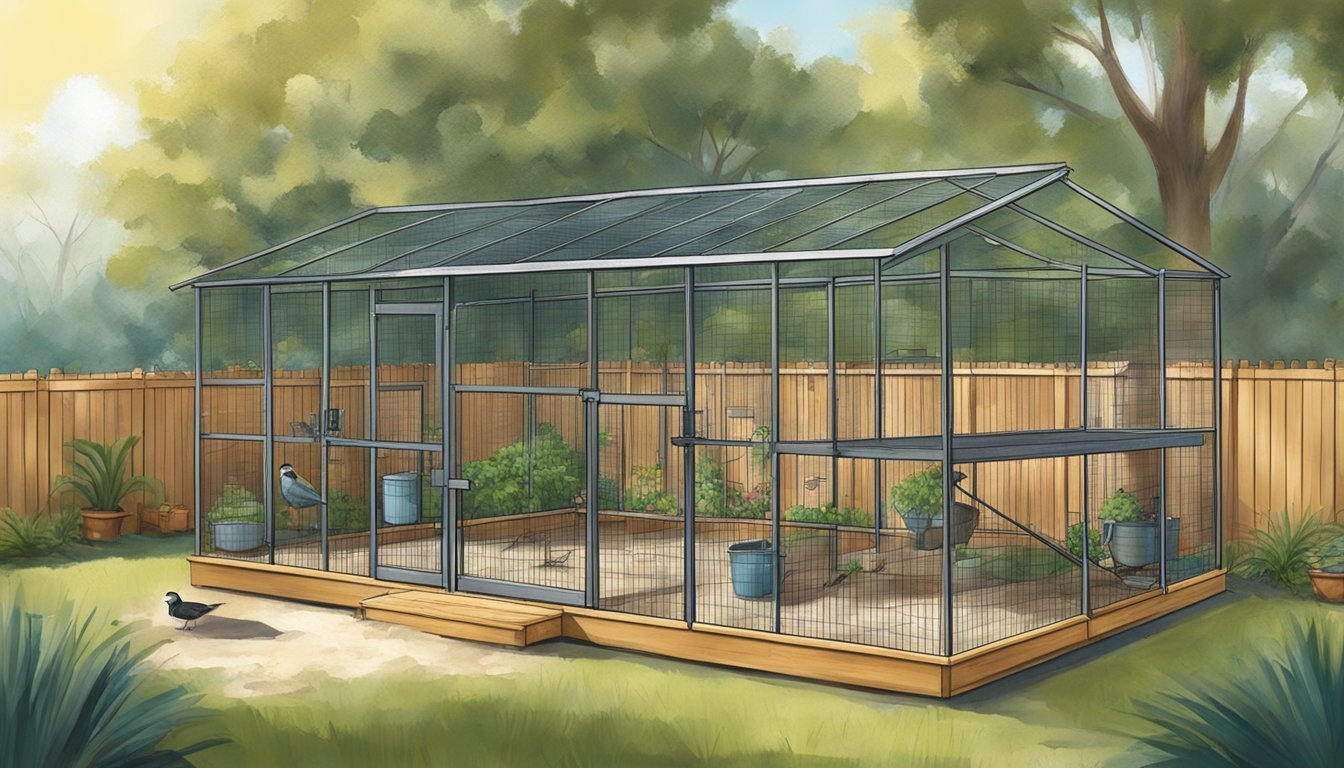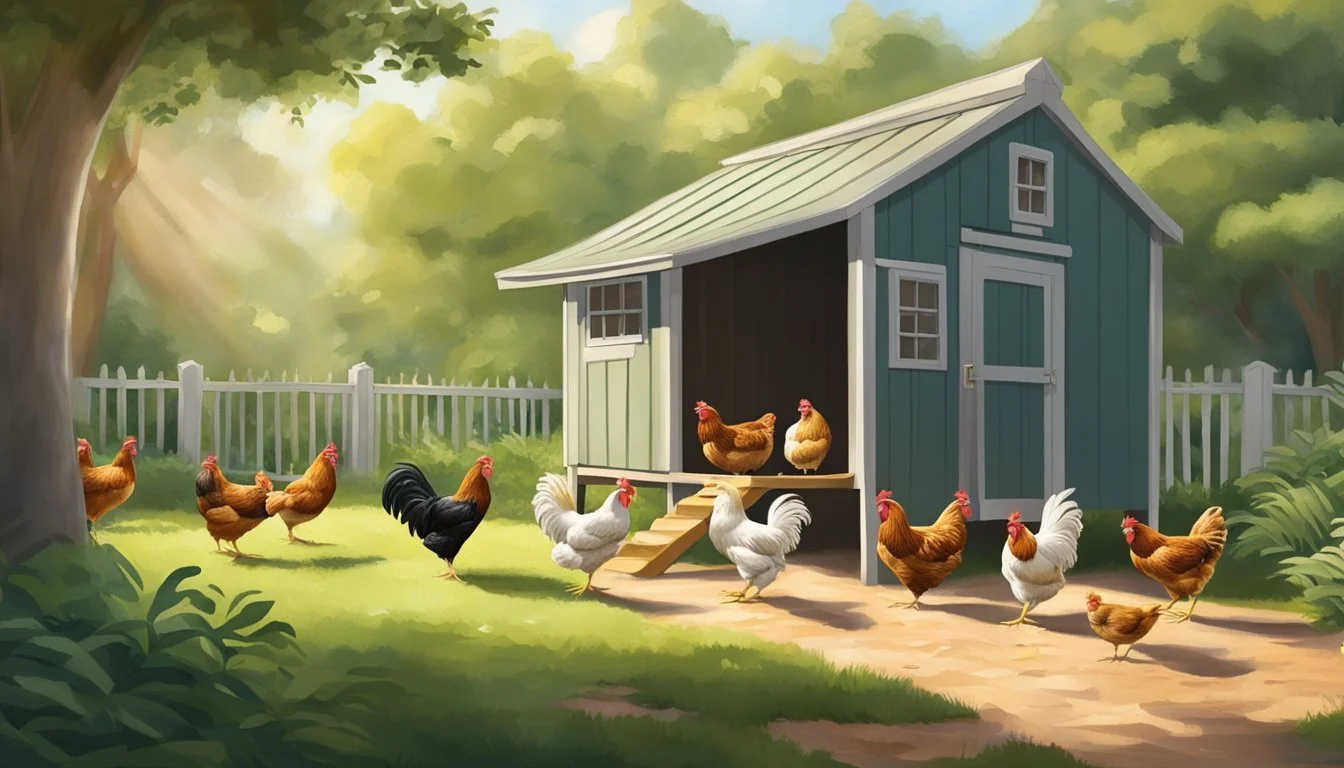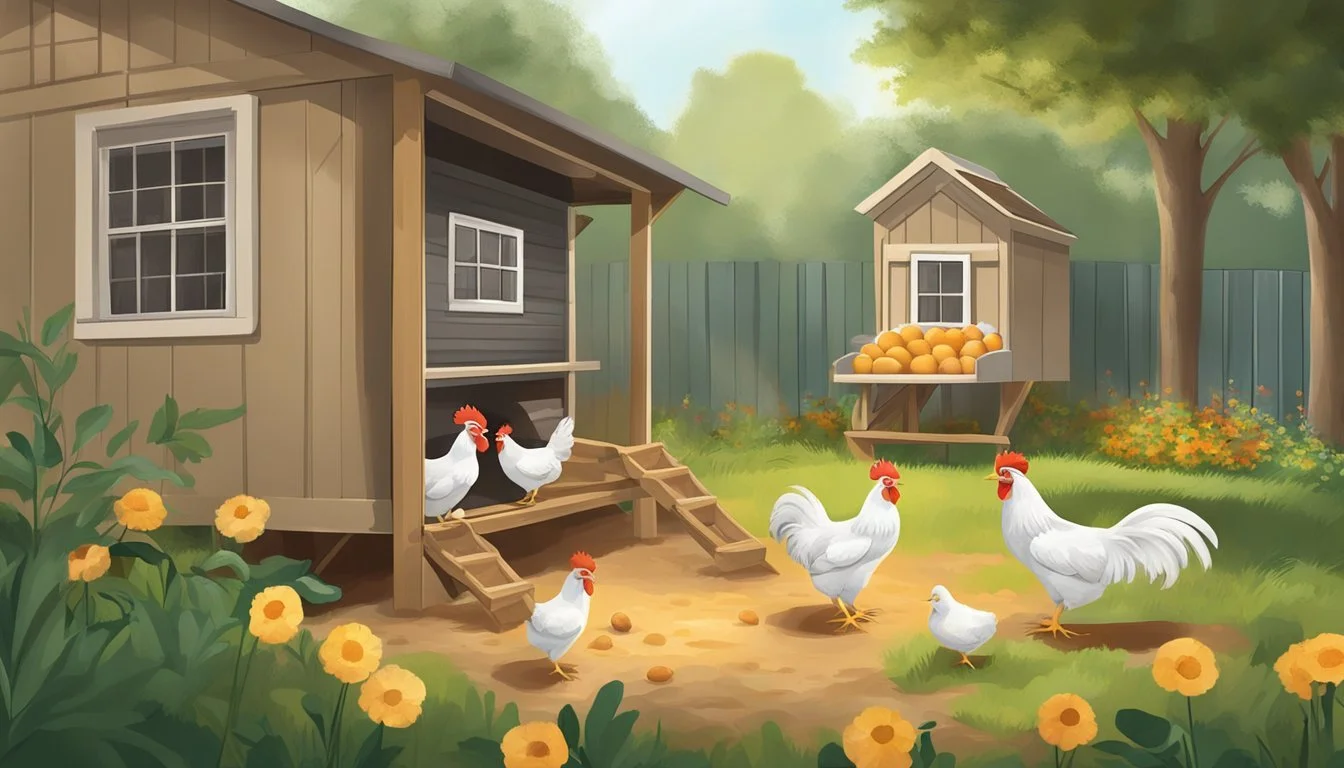Keeping Backyard Chickens in Tallahassee, FL
Essential Tips for Urban Poultry Farming
Keeping backyard chickens has become an increasingly popular practice in cities across the United States as individuals seek sustainability and local food production. In Tallahassee, Florida, the trend of raising poultry in urban backyards is supported by municipal codes designed to balance urban agriculture with neighborhood harmony. Residents of Tallahassee have the opportunity to embrace the benefits of fresh eggs and the pleasure of tending to chickens, provided they adhere to the specific regulations that govern the practice within the city limits.
Under Tallahassee’s regulations, homeowners with at least 5 acres may freely keep hens, while those with smaller properties can also engage in chicken keeping as long as the birds are housed in a secured yard or pen. This ensures that the chickens do not encroach upon neighboring properties, with a stipulation that they remain at least 20 feet away from any neighboring houses. Additionally, while hens are the main focus for many backyard poultry enthusiasts, the city code also allows for the inclusion of a single rooster in the flock, which can facilitate natural breeding processes.
Health and safety are important considerations when managing a backyard flock in any urban area. Salmonella is a known risk associated with poultry, so maintaining clean practices and proper handling is a crucial aspect of responsible chicken keeping. Tallahassee residents are thus encouraged to stay informed about and comply with health guidelines to ensure that their endeavors into urban poultry farming are both enjoyable and safe for all involved.
Understanding Local Chicken Laws
Keeping backyard chickens in Tallahassee requires awareness of various regulations at the city, county, and state levels. These laws determine where and how residents can raise chickens, addressing nuances like property size, coop placement, and the number of chickens allowed.
Tallahassee City Ordinances
In Tallahassee, chicken ordinances specify that residents may keep hens on properties that are at least 5 acres. For properties smaller than this, hens must be kept in a secured yard or pen, ensuring they are no closer than 20 feet from any neighbor's house. Additionally, each flock is permitted to have one rooster if hens are allowed on the property.
Leon County Regulations
Leon County's regulations fall in line with those of the city of Tallahassee. However, it is important for residents to confirm with the Leon County Courthouse for any additional or evolving local ordinances. These ordinances could include specific permit requirements, coop constraints, and restrictions on the number or type of fowl.
Florida State Chicken Laws
Statewide, Florida chicken laws generally allow for backyard chickens, but emphasize the necessity of following local zoning regulations. These statewide rules are meant to coexist with local chicken laws, which can vary from one municipality to another. Residents are advised to directly consult their local government to ensure no specific permits or additional regulations must be observed.
Setting Up Your Chicken Coop
When establishing a backyard chicken coop in Tallahassee, FL, residents must adhere to specific regulations regarding location, design, and predator protection. These factors ensure the wellbeing of the chickens and compliance with local laws.
Choosing the Right Location
The location of a chicken coop is crucial for the health of the chickens and to abide by Tallahassee's ordinances. It is required that coops be positioned:
In the rear yard of the property.
At a minimum distance of 20 feet from neighboring homes.
At least 10 feet away from any side or rear property lines.
Choosing an appropriate site for the coop facilitates proper care and minimizes conflicts with neighbors, adhering to these strict placement guidelines.
Coop Design Requirements
Building a chicken coop in Tallahassee necessitates attention to structure and amenity requirements such as:
Ventilation: Coops must be well-ventilated to keep the air fresh and reduce moisture buildup, which can lead to health issues.
Space: Each bird requires between 2-3 square feet inside of the coop, while enclosures should provide 8-10 square feet for outdoor roaming.
Roof Cover: The coop should have a solid roof cover to protect the chickens from the elements and predators.
Adhering to these design elements not only aligns with the local building code but also promotes the birds' welfare and productivity.
Protecting Against Predators
Protecting chickens from predators is essential for their survival. Measures to secure the hen house include:
Enclosure: Ensure the coop and attached run are fully enclosed with sturdy materials like hardware cloth.
Security: Inspect for areas where predators might dig or squeeze through and reinforce them as needed.
Implementing these strategies diligently will keep chickens safe and mitigate risks from local wildlife.
Daily Chicken Care and Management
Effective daily care for backyard chickens in Tallahassee, FL, hinges on proper feeding, ensuring a steady supply of clean water, and disease prevention to maintain a healthy flock.
Feeding and Nutrition
Chickens require a balanced diet to stay healthy. A typical diet includes commercially prepared chicken feed that's rich in protein. Owners should provide layers with layer pellets to support egg production. It's important to measure the feed based on the size and number of chickens. Scratch grains can be offered sparingly as a treat. One can also supplement their diet with vegetables and fruits; however, avoid giving chickens avocado, chocolate, or raw beans, as these are toxic to them.
Feeders should be positioned to prevent contamination with droppings. They should also be sturdy to minimize spillage and large enough to accommodate the entire flock at once.
Water Supply and Cleanliness
Poultry requires access to clean and fresh water at all times. Water containers must be cleaned daily to prevent algae and bacterial growth. In hot weather or during times of increased laying, chickens will drink more water. It's essential to regularly check and refill water supplies.
For best practices:
Use waterers that chickens can't tip over.
Position waterers in the shade to keep water cool.
Apply vinegar or a commercial cleaner suitable for chickens to maintain cleanliness.
Health and Disease Prevention
Chickens must be monitored for signs of illness, including changes in eating habits or egg production, lethargy, or abnormal droppings. Good coop hygiene is crucial for disease prevention. Coops should be cleaned regularly with the removal of waste and wet bedding.
Vaccinations are a preventive measure for common diseases. It's recommended to research local requirements or recommendations on vaccinations. Designated “biosecurity” practices, such as disinfecting shoes or tools before entering the coop area, can prevent the spread of diseases. Owners must also take care to wash their hands before and after handling chickens or eggs.
Egg Production and Usage
In Tallahassee, backyard chicken enthusiasts can expect their laying hens to produce about 200-240 eggs per year. Proper hen management and egg handling are critical for maximizing outputs and ensuring the freshness and safety of the produce.
Maximizing Egg Laying
Breed selection plays a vital role in egg production. Some hens are more prolific egg layers than others. Adequate light exposure—14 to 16 hours a day—is essential to stimulate egg-laying. Installing a light source in the coop can help maintain consistent production, especially during shorter days. Nutrition is also important; a diet rich in protein and calcium can boost egg production.
Collecting and Storing Eggs
Eggs should be collected at least once a day to ensure cleanliness and prevent hatching. After collection, they need to be stored properly to extend their shelf life. The ideal storage temperature is 45°F to 55°F (7°C to 13°C) with a relative humidity of 70 to 80%. It's advisable to refrigerate eggs if they will not be used within a week.
Utilizing Fresh Eggs
Fresh eggs from backyard chickens can be used in the same manner as store-bought eggs. They are suitable for baking, cooking, and eating raw in properly prepared dishes. Fresh eggs have a richer flavor and are a preferred choice of many culinary enthusiasts. It's important to wash eggs with warm water and sanitize hands both before and after handling to reduce the risk of Salmonella contamination.
Flock Management and Sustainability
Effective flock management and sustainability practices ensure the well-being of backyard chickens in Tallahassee, focusing on proper flock size, breeding controls, and implementing eco-friendly methods.
Managing Flock Size
An essential aspect of managing a backyard flock is ensuring that the space requirements are met. In Tallahassee, hens are allowed on properties of various sizes, but conditions apply such as restrictions on proximity to neighboring homes. Flock size should be regulated according to the available space to maintain a healthy, stress-free environment.
Breeding and Population Control
Flock owners should understand that specific laws govern the keeping of roosters. Tallahassee's ordinances permit the presence of a single rooster per flock primarily for breeding purposes. This facilitates population control within the flock while also minimizing noise levels, which can be a nuisance in urban settings.
Sustainable Practices
Sustainability in backyard chicken keeping involves practices that enhance the productivity and health of the flock, while also benefiting the environment. Adopting a sustainable approach can include:
Utilizing chicken waste as compost for gardens, converting waste into a resource.
Implementing rotational grazing systems, allowing ground recovery and reducing the need for chemical fertilizers.
By adhering to these guidelines, residents can maintain a productive and sustainable backyard flock that provides eggs or meat while also enriching the local ecosystem.
Legal and Social Considerations
In Tallahassee, Florida, the residents considering keeping backyard chickens must navigate not only city ordinances but also social expectations and homeowners' association rules. These guidelines are put in place to maintain community harmony and public health.
Neighbor Relations
One should maintain a distance of at least 20 feet between the chicken coop and any neighbor's house to comply with Tallahassee city regulations. Good neighbor relations are key, given the proximity constraints. One might also consider discussing their intentions with adjacent neighbors to avoid any future issues.
Homeowners' Association Rules
Residents should review their Homeowners' Association (HOA) bylaws because they may have stricter rules than the city ordinances. HOA rules may address the presence of livestock directly, impose additional restrictions, or in some cases, prohibit chickens altogether.
Noise and Nuisance Laws
While the city allows the keeping of hens and a single rooster per flock, noise can become a concern—especially with roosters. Noise and nuisance laws are in place to prevent disruption. In cases of persistent noise, residents may contact the local authorities regarding nuisance laws that are designed to protect the peaceful environment of the community.
Residents should refer to the most updated city ordinances and regulations or contact the city directly for more information on permits required for backyard chickens. It's important to avoid animal hoarding, and one should always keep the number of chickens within the allowed limits defined by the city. Resources for urban chicken farming are available at the Leon County Courthouse or through various online platforms dedicated to local livestock rules.
Additional Resources and Contacts
For residents of Tallahassee who are interested in or currently keeping backyard chickens, there are several resources and contacts available to provide assistance, guidance, and community support.
Local Chicken Farming Communities
There are various local farming communities and online forums where chicken enthusiasts in Tallahassee can share experiences, tips, and advice. One such platform is the BackYard Chickens community, which discusses local ordinances, chicken care, and other related topics.
Governmental Agricultural Services
Leon County Agricultural Extension Service is a pivotal resource for backyard chicken keepers. They provide educational resources and can help with questions regarding local regulations:
Contact: Leon County Courthouse
Address: 301 S Monroe St, Tallahassee, FL 32301
Phone: (850) 606-5300
Email: Website Feedback Form
For broader regulations including different cities within Florida such as Miami, Orlando, or Tampa, contacting Florida Department of Agriculture and Consumer Services is advisable.
Professional Poultry Associations
Joining a professional poultry association can provide numerous benefits including networking, education, and advocacy. The Florida Poultry Federation offers support and information that might be relevant for Tallahassee residents and those in surrounding areas such as Jacksonville, Gainesville, and Orange County.









